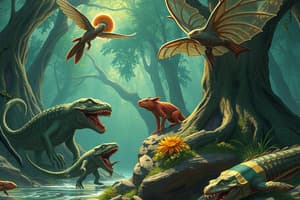Podcast
Questions and Answers
What is the primary function of the nephron in the kidney?
What is the primary function of the nephron in the kidney?
- To produce hormones for blood regulation
- To filter blood and form urine (correct)
- To store urine before excretion
- To absorb nutrients from digested food
During which phase of the ovarian cycle does the corpus luteum develop?
During which phase of the ovarian cycle does the corpus luteum develop?
- Luteal phase (correct)
- Follicular phase
- Ovulatory phase
- Menstrual phase
Which of these phyla possess exoskeletons?
Which of these phyla possess exoskeletons?
- Arthropoda (correct)
- Echinodermata
- Chordata
- Annelida
What occurs during the process of filtration in the excretory system?
What occurs during the process of filtration in the excretory system?
What triggers the surge of luteinizing hormone (LH) during the ovarian cycle?
What triggers the surge of luteinizing hormone (LH) during the ovarian cycle?
What type of competition is demonstrated when leopards deplete the warthog population that tigers rely on for food?
What type of competition is demonstrated when leopards deplete the warthog population that tigers rely on for food?
In which scenario does apparent competition occur?
In which scenario does apparent competition occur?
What does resource partitioning allow species to do?
What does resource partitioning allow species to do?
How does intraspecific competition affect a species?
How does intraspecific competition affect a species?
What is the primary difference between exploitation and apparent competition?
What is the primary difference between exploitation and apparent competition?
Which of the following best describes the outcome of an increase in leopards on the warthog population?
Which of the following best describes the outcome of an increase in leopards on the warthog population?
What ecological concept explains how two species can coexist by feeding at different depths in a habitat?
What ecological concept explains how two species can coexist by feeding at different depths in a habitat?
What are the major forces driving the formation of the phospholipid bilayer?
What are the major forces driving the formation of the phospholipid bilayer?
How do CAM plants minimize photorespiration in hot environments?
How do CAM plants minimize photorespiration in hot environments?
What is a consequence of nondisjunction occurring during the first meiotic division?
What is a consequence of nondisjunction occurring during the first meiotic division?
Which of the following is formed as a product of beta-oxidation?
Which of the following is formed as a product of beta-oxidation?
What happens if the Na+/K+ pumps cannot hydrolyze ATP?
What happens if the Na+/K+ pumps cannot hydrolyze ATP?
What is the primary role of the Na+/K+ ATPase in cells?
What is the primary role of the Na+/K+ ATPase in cells?
Which statement best describes van der Waals forces in the context of the phospholipid bilayer?
Which statement best describes van der Waals forces in the context of the phospholipid bilayer?
Why do CAM plants open their stomata at night?
Why do CAM plants open their stomata at night?
What results from the absorption of fatty acids during beta-oxidation?
What results from the absorption of fatty acids during beta-oxidation?
During which phase of meiosis does nondisjunction typically occur?
During which phase of meiosis does nondisjunction typically occur?
Flashcards are hidden until you start studying
Study Notes
Ecological Concepts
- Exploitation Competition: Indirect competition where one species reduces the availability of a resource for another. Example: Increased leopard population depleting warthog resources for tigers.
- Resource Partitioning: Coexistence of species in the same habitat by utilizing different niches. Example: Two fish species living at different depths to avoid competition.
- Apparent Competition: Occurs when one species' population increase leads to another species' decline through a shared predator. Example: Higher owl numbers reduce the spider population due to predation.
- Intraspecific Competition: Competition among individuals of the same species for limited resources, leading to potential conflicts. Example: Two basil plants competing for water and nutrients in a small pot.
Phospholipid Bilayer Formation
- Major Forces: Formation driven primarily by hydrophobic interactions and maintained by van der Waals forces.
- Phospholipid Orientation: Fatty acid tails face inward, while hydrophilic phosphate heads face outward, away from the aqueous environments.
Crassulacean Acid Metabolism (CAM)
- Mechanism: CAM plants reduce photorespiration in hot climates through temporal isolation of processes.
- Stomata Behavior: Stomata open at night for CO₂ uptake and close during the day to minimize water loss, utilizing the stored CO₂ for the Calvin cycle.
Nondisjunction in Meiosis
- Definition: Nondisjunction is the failure of chromosomes to separate properly during meiosis, leading to aneuploidy.
- Meiosis I Nondisjunction Outcomes: Results in two cells with an extra chromosome (n+1) and two with one less chromosome (n-1). Post-fertilization options are 47 (2n+1) or 45 (2n-1) chromosomes.
Beta-Oxidation
- Location: Occurs in the mitochondrial matrix.
- Products: Acetyl-CoA, NADH, and FADH2 generated from fatty acid breakdown. Acetyl-CoA enters the citric acid cycle.
Na+/K+ ATPase Function
- Function: Actively pumps sodium out (3 Na+) and potassium in (2 K+) against their concentration gradients.
- Effects of ATP Hydrolysis Failure: Inability to hydrolyze ATP results in sodium accumulation inside the cell and potassium outside, disrupting electrochemical gradients.
Arthropods and Body Structure
- Key Characteristics: Possess exoskeletons, segmented bodies, jointed appendages, triploblastic development, and bilateral symmetry.
- Comparison with Other Phyla: Annelids (segmented worms) lack exoskeletons, chordates have notochords, and echinoderms exhibit radial symmetry without segmentation.
Kidney Filtration
- Filtration Site: Takes place at the renal corpuscle, composed of the glomerulus and Bowman’s capsule.
- Nephron Functions: Includes filtration, reabsorption of substances back into the bloodstream, secretion of waste, and excretion of urine.
Ovarian Cycle and Luteal Phase
- Luteal Phase: Follows ovulation and involves corpus luteum development, secreting estrogen and progesterone to thicken the uterine endometrium.
- Distinction from Other Phases: Secondary oocyte release and hormone peaks occur during the follicular phase, not the luteal phase.
Studying That Suits You
Use AI to generate personalized quizzes and flashcards to suit your learning preferences.




